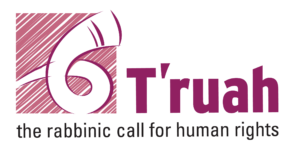NEW YORK – Following the death of Tyre Nichols at the hands of Memphis police, T’ruah, a rabbinic human rights organization representing over 2,300 rabbis and cantors in the US and Canada, mourned his death and called for justice.
In a statement, Rabbi Jill Jacobs, CEO of T’ruah, said:
“T’ruah mourns the murder of Tyre Nichols by Memphis police officers. Tyre Nichols was a young Black father and photographer who was on his way home from taking pictures when police officers pulled him over in a traffic stop, minutes away from his home, and brutally beat him, causing fatal injuries. This latest incident of police violence is heartbreaking, yet not surprising, within an unjust system of policing that disproportionately targets Black people and other people of color, too often leading to serious injury or death. The abuse of power by the police officers involved shows a disturbing disregard for human dignity.
“Though some will suggest the race of the majority of officers in this case proves racism wasn’t a factor, the reality is that the institution of policing itself is rooted in white supremacy and has a long history of racism — from 18th century Southern slave patrols to the 20th century enforcement of Jim Crow laws, and through the targeting of Black and brown people for police stops in the 21st century.
“Despite promises from elected officials, police violence remains a major issue, especially in Black, brown, and poor communities. Just a week after Nichols died and a few hundred miles away, a Georgia state trooper murdered Manuel “Tortuguita” Teran, an environmental activist protesting the destruction of a public forest to make space for a massive police training facility. We mourn Manuel Teran’s death— yet more evidence of the need to reimagine public safety — alongside Tyre Nichols, and all victims of police violence.
“On the week of Tyre Nichols’s death, the Jewish community began reading the book of Exodus, which details both the cruelty of a government that targeted a minority population, including through violence and systemic discrimination, and the liberation that comes with breaking free of this system. Tyre Nichols’s murder reminds us of our moral duty to turn our grief into action. We stand with the protestors in Memphis and around the country who are honoring Tyre Nichols’s life by demanding accountability and change.”
T’ruah: The Rabbinic Call for Human Rights mobilizes a network of more than 2,300 rabbis and cantors from all streams of Judaism that, together with the Jewish community, act on the Jewish imperative to respect and advance the human rights of all people. Grounded in Torah and our Jewish historical experience and guided by the Universal Declaration of Human Rights, we call upon Jews to assert Jewish values by raising our voices and taking concrete steps to protect and expand human rights in North America, Israel, and the occupied Palestinian territories.

